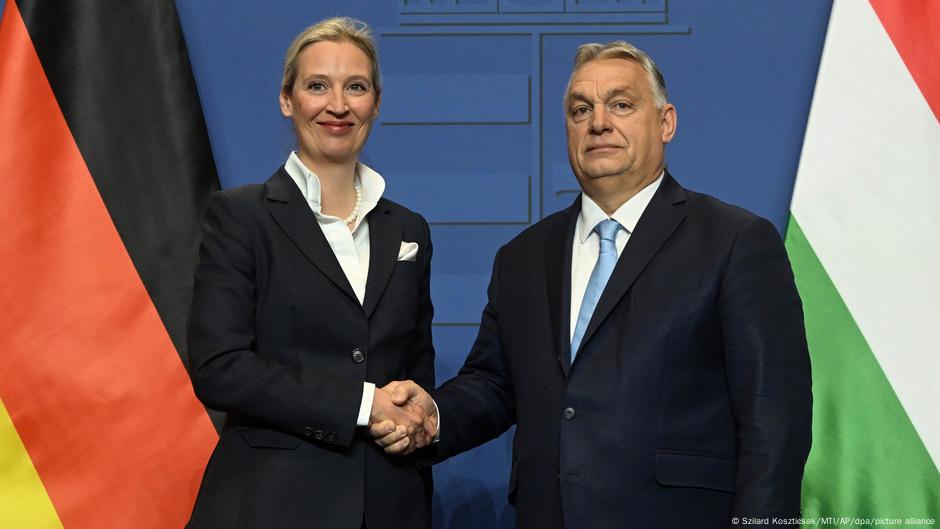Germany’s domestic intelligence agency, the Federal Office for the Protection of the Constitution (BfV), has classified the as “confirmed right-wing extremist.” Germany’s other political parties want mostly nothing to do with it. Some politicians have even What does the situation look like in
The Netherlands: Partij voor de Vrijheid
Geert Wilders’ Party for Freedom (PVV) recently caused the four-party coalition that it led to collapse because it had not cracked down hard enough on migration in its view. “I proposed a plan to close the borders for asylum seekers, to send them away, to shut asylum shelters. I demanded coalition partners sign up to that, which they didn’t,” Wilders told reporters. “I signed up for the strictest asylum policies, not for the demise of
New elections are now planned for autumn.
Although his party became the strongest force in the parliamentary elections, did not become head of government because he was deemed too radical by his coalition partners. Instead, independent politician Dick Schoof was nominated prime minister of the Netherlands.
If it were up to Wilders alone, he would ban all new mosques and the Quran. He is also a vocal critic of green strategies to tackle climate change, and he views the European Union as being too overbearing.
Wilders is in complete control of his party, of which he is the sole registered member; even deputies and ministers are officially only supporters of the PVV. This allows Wilders to decide on the party program alone and appoint all election candidates himself.
Poland: Prawo i Sprawiedliwosc
The was defeated in the parliamentary elections at the end of 2023; Donald Tusk, the liberal former European Council president, has governed as prime minister since then. But the PiS holds the presidency, and can use a veto to put the brakes on government policy.
This has not changed since the presidential election at the end of May 2025, who ran an anti-European, and anti-German, campaign.
Generally, however, as a party the PiS is rather cautious in Brussels, since it knows that the funds from the EU are important for Poland. It has also positioned itself on Ukraine’s side in the war with Russia and advocates a strong NATO presence against its powerful neighbor.
In terms of migration policy, however, the party shares the same hardline views of its European allies. On social issues, it is close to the Catholic Church in Poland and opposes the legalization of abortion, same-sex marriage and adoption.
Hungary: Fidesz
Fidesz-Hungarian Civic Alliance is probably the most successful far-right party in Europe. Thanks to its leader , the party was in power in between 1998 and 2002 and continuously again since 2010. Founded in 1988, shortly before the collapse of communism, as a radical liberal force, the party remained on this course for a long time.
But Orban and his party has swung to the right since at least 2015, when German Chancellor Angela Merkel proclaimed a “welcome culture” for refugees. Fidesz is now explicitly in favor of illiberal democracy, seeing the “Christian West” as threatened by foreign infiltration and wanting to strongly limit the influence of the EU.
In stark contrast to the Polish PiS, the party has sought contact with Russia, particularly on energy issues. Orban is also close to Russian President Vladimir Putin on an ideological level.
However, unlike similar parties, the party does recognize human-made climate change as a threat.
Slovakia: Smer — slovenska socialna demokracia
Smer was founded by current Called Direction-Slovak Social Democracy, the party direction is clearly to the right and the social democracy it advocates has little to do with Germany’s style of social democracy. Smer has warned that Slovakia is becoming too “foreign.”
Fico has said that Muslims are not able to integrate and in 2016 he said that Islam had no place in Slovakia.
He has described the Ukrainians that Russia has attacked as “Nazis and fascists” and before the 2023 parliamentary elections, in which Smer emerged victorious, he announced that he would put an immediate stop to arms deliveries to Ukraine.
He went on to do this, claiming that NATO and the United States were responsible for Russia’s attack on Ukraine. This triggered protests across
Fico’s government has repeatedly criticized the EU’s sanctions against Russia as being “meaningless and counterproductive.”
Spain: Vox
Vox (Latin for voice), whose leader is Santiago Abascal, has risen fast since the party was founded in 2013. In the 2016 parliamentary elections, it won only 0.2% of the votes. This went up to 15% in 2019. Since then, its success has slumped somewhat.
The party is nonetheless the third strongest political force in at the moment. However, it has never participated in a federal government. The conservative Partido Popular (Popular Party) might have been willing to form a coalition with it, but instead it was the socialist Pedro Sanchez who formed a government.
Vox’s main concern is specific to Spain: The party believes that the self-government rights of autonomous communities such as or the Basque Country should be revoked and that Spain should once again become a centralized state. There is also a particular Spanish flavor to the party’s anti-immigration and anti-Islamic tones: Abascal has called for a new Reconquista. The first, which ended in 1492, was a series of campaigns waged by Christian rulers against Muslim kingdoms that had ruled the Iberian Peninsula for centuries.
At the beginning of February, Vox hosted a major event called “Make Europe Great Again” in the Spanish capital Participants included Hungarian Prime Minister Viktor Orban and French far-right politician Marine Le Pen.
Denmark: Dansk Folkeparti
The Danish People’s Party was founded in 1995 and had its most successful period in the 2000s and 2010s. With its anti-immigration, anti-globalization and anti-EU positions, combined with demands for a strong welfare state, it provided support for several center-right governments in the Danish capital Notably, it was able to push through a tightening of the asylum system.
But support for the party dwindled after 2019 as Denmark’s Social Democrats, led by Mette Frederiksen, not only adopted its anti-asylum demands but also pushed them through. The People’s Party only received 2.6% of the vote in the last parliamentary election in 2022. The of current Social Democratic government is one of the toughest in Europe.
This article was translated from German.
The post European far-right parties on the rise appeared first on Deutsche Welle.




